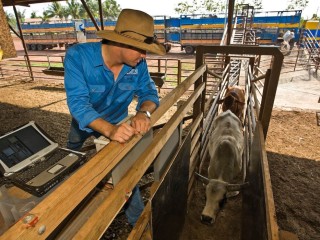 The Australian Live Exporters Council has endorsed a policy where all Australian live export cattle, regardless of destination, must now carry an RFID identification device before loading.
The Australian Live Exporters Council has endorsed a policy where all Australian live export cattle, regardless of destination, must now carry an RFID identification device before loading.
The policy had been implemented as “part of the industry’s commitment to ensure a traceability system for cattle once they leave Australian shores, throughout the supply chain,” stakeholders were told this week.
Significantly, the ALEC regulation calls only for the use of RFID tags, not NLIS tags, and the process does not necessarily currently operate under the National Livestock Identification System.
While all other markets insist on use of NLIS tags in their import protocols, three markets – Indonesia, Malaysia and the Philippines – make no such distinction. In the case of Indonesia, it is the Australian Government, not the importing country, that has imposed an identification tag requirement, either electronic or visual, under the new supply chain assurance system.
The new ALEC identification policy insisting on an RFID tag was implemented from July 1, before the new Government system came into play.
Under the ALEC requirement, exporters are insisting on RFIDs because they see this as the most ‘practical way’ of retaining identity, executive director Lachie McKinnon said.
While both ALEC and the Cattle Council of Australia have long-standing ‘no exemptions’ policies as part of their approach to the National Livestock Identification System, the latest development stops one step short of achieving that, as RFID tags under the new policy will only have to be in place prior to loading on ship – not at property of origin.
However the exemptions clause that currently applies to cattle sourced direct to ship from properties of breeding origin in the Northern Territory is covered by state legislation, and is beyond the powers of industry to control (see earlier Beef Central stories “Big role for NLIS in Indon trade resumption” and “Time to make NLIS truly National.”
Cattle Council of Australia president Greg Brown said the move by ALEC was ‘refreshing, and a significant step,’ but the gap that existed in not having a truly national NLIS system, without exemptions, remained.
“Our CCA policy has always been for a no-exclusions NLIS system,” Mr Brown said.
“In our recent council telephone hook-up, the only region opposed to that was the NT. Bu as far as CCA is concerned, exemptions have to go, and this latest move by ALEC helps pave the way for that to happen,” he said.
It was unrealistic for the Territory to still be hanging-on to its exemption clause, under the circumstances.
There is no practical reason why those tags cannot now be applied at property of origin, rather than at the port, Mr Brown said.
“In fact the great majority of NT cattle I saw during my most recent trip to Indonesia all had NLIS tags in their ears already, installed by choice for management purposes.”
The ultimate benefit in removing the current NT exemption for the broader Australian industry would be that it would elevate NLIS’s international standing and integrity as a ‘no ifs, no buts’ traceability system covering all Australian cattle, regardless of location or circumstance.
“CCA believes NLIS is the only system that should apply in Indonesia. It is the only system that has any authority here in Australia, and the Indonesian Government is in no way wedded to the RFID option. In this case, where AQIS has some authority, we thought the industry and NLIS would hold the whip-hand over this issue. We don’t see that we could give them any other option,” Mr Brown said.
